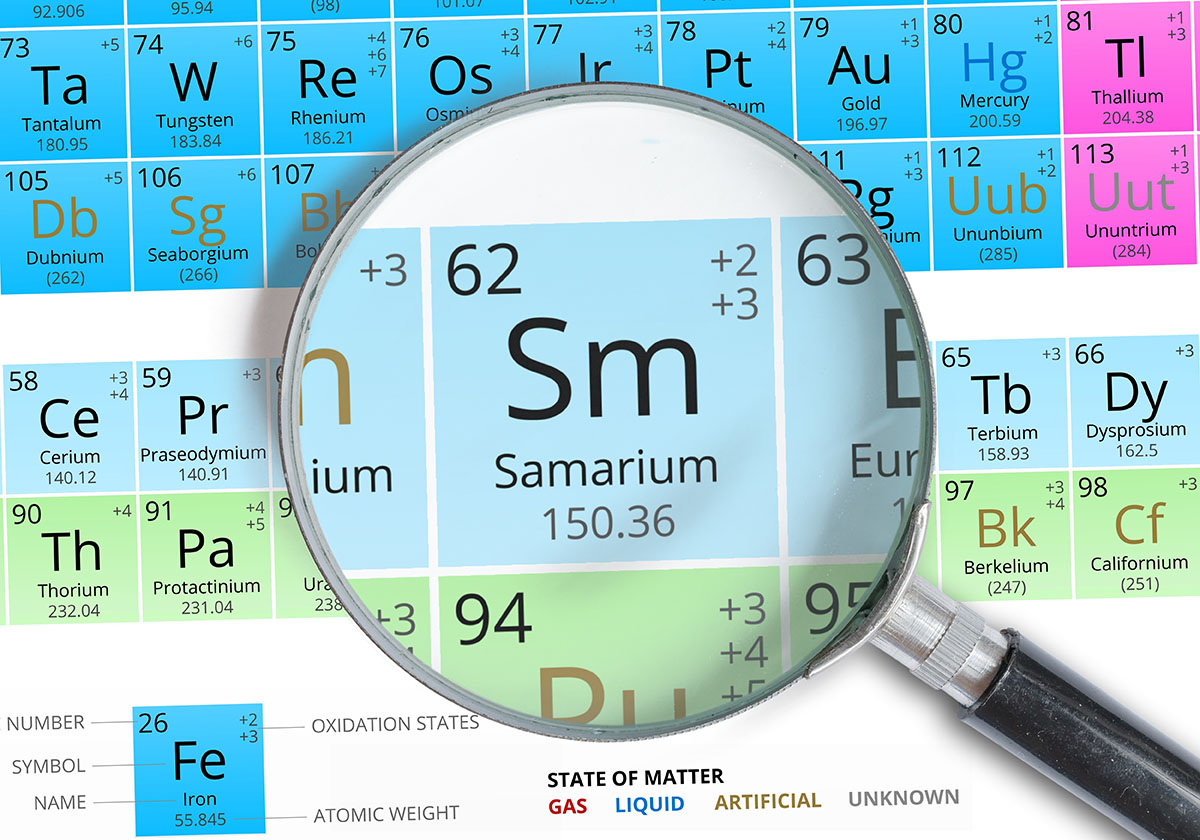
samarium
Definition
Samarium is a chemical element with the symbol Sm and atomic number 62. It is a rare-earth element that is found in the mineral samarskite. Samarium is a silvery-white metal that is soft and ductile. It is also a very strong magnet.
Samarium has a number of unique properties that make it useful in a variety of applications. For example, samarium is a very strong magnet, which makes it useful in the production of permanent magnets. Samarium is also a good conductor of heat and electricity, which makes it useful in applications where these properties are needed.
Samarium is used in a variety of applications, including:
- Magnetic devices: Samarium is used in the production of permanent magnets, such as those used in hard drives and electric motors. Samarium magnets are more powerful than other types of magnets, such as neodymium magnets.
- Lighting: Samarium is used in the production of fluorescent lamps and high-intensity discharge lamps. Samarium-doped phosphors emit a bright green light, which is why they are used in these types of lamps.
- Nuclear reactors: Samarium is used in nuclear reactors to control the reaction rate. Samarium absorbs neutrons, which helps to slow down the reaction.
- Medical applications: Samarium is used in medical imaging, such as magnetic resonance imaging (MRI). Samarium is used to create a contrast agent that helps to improve the images produced by MRI.
Samarium is a relatively rare element, but it is not as rare as some other rare-earth elements. Samarium is mined in a number of countries, including China, the United States, and Russia.
How can the word be used?
Samarium is a rare-earth element.

Different forms of the word
Noun:
a silvery-white, rare-earth metallic element with the symbol Sm and atomic number 62.
Etymology
The word "samarium" is derived from the name of the mineral samarskite, from which it was first isolated.
The first recorded use of the word "samarium" in English was in 1879.
The word "samarium" is named after the Russian mine official Vasili Samarsky-Bykhovets (1745-1814), who gave the ore sample to the German mineralogist Heinrich Rose, who isolated the element.
Question
What can samarium used for?
AQA Science Exam Question and Answer
Question:
Describe the key properties and uses of samarium in modern technologies.
Answer:
Samarium, a rare earth element, possesses distinct properties that make it valuable in various modern technologies. It exhibits high magnetic susceptibility, allowing it to be used in powerful permanent magnets, such as those found in headphones, electric motors, and wind turbines. These magnets are crucial components in renewable energy generation and efficient electronic devices.
Additionally, samarium is employed in nuclear reactors due to its ability to capture neutrons and control nuclear reactions. This property makes it an essential component in control rods, which help regulate the rate of fission in reactors, ensuring safe and controlled energy production.
Samarium's capacity to emit intense and specific wavelengths of light, known as fluorescence, finds applications in specialised lighting systems, lasers, and medical imaging devices. It is utilised in fluorescent lamps, lasers used for surgery and research, and as a contrast agent in certain types of magnetic resonance imaging (MRI).
In conclusion, samarium's magnetic, nuclear, and optical properties make it an indispensable element in various modern technologies. From renewable energy to medical diagnostics, its versatile applications underscore its significance in advancing contemporary science and technology.